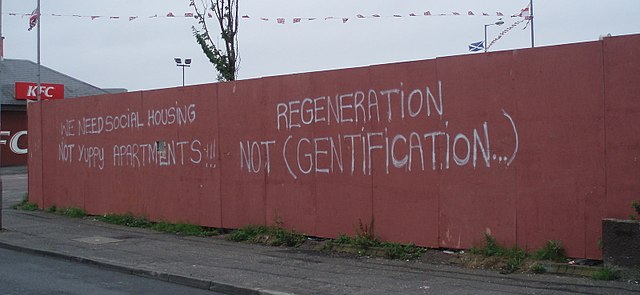Land Use
New Frameworks to Address Vehicle Travel Impacts
CLEE report proposes banking and exchange strategies for CEQA mitigation
When Caltrans and other state and local agencies build or approve projects that increase car traffic, state law requires them to mitigate those impacts. A new report from CLEE proposes development of state and regional programs that would allow these agencies to mitigate by investing in offsite bike lanes, bus-only lanes, transit passes, and other …
Continue reading “New Frameworks to Address Vehicle Travel Impacts”
CONTINUE READINGAn Abundance Research Agenda
If we need to build lots of things fast to address climate and housing crises, how will we do that?
There’s been a lot of buzz about this column by Ezra Klein in the New York Times. Klein’s basic argument: We need to do a lot of infrastructure and other development projects to make the world a better place. For example, we’ll need to build power lines and renewable projects to address climate change. But …
Continue reading “An Abundance Research Agenda”
CONTINUE READINGMy Kind of Town
Climate change is coming to Chicago and Lake Michigan.
“My kind of town, Chicago is my kind of town.” Or so Frank Sinatra sang. I’m not sure he really felt that way himself, but the song rings a chord with me. I didn’t grow up in Chicago but we visited frequently to see my parents’ families. Chicago is also, as it turns out, ground …
Continue reading “My Kind of Town”
CONTINUE READINGWhy Energy Conservation Will Remain Crucial
Even after switching to clean power, we’ll still need to limit energy use.
If we switch to renewables, we won’t need to worry about saving energy. Right? Wrong! One reason to save energy is to limit carbon emissions from the energy we use. That’s going to important until the energy system has been completely cleaned up. But energy conservation is important for reasons that go beyond the direct …
Continue reading “Why Energy Conservation Will Remain Crucial”
CONTINUE READINGClimate Candidates Notch Victories in Major City Council Races Across Western U.S.
Voters choose new candidates with strong climate platforms in Los Angeles, Phoenix, San Diego, and other large cities across the West
While ballot counting continues across the country, city council races are now being called, with new climate champions set to take office in large Western U.S. cities that held elections this week. Many of the victors are taking on their first elected positions. Candidates with inspiring and ambitious climate platforms notched victories in six large …
CONTINUE READINGLearning Lessons from Los Angeles’s TOC Program
Challenges and opportunities as TOC continues to drive affordable housing production
I’ve written before about Los Angeles’ Transit Oriented Communities (TOC) Program, an inclusionary housing program designed to allow for increased density in residential and mixed-use projects near major transit stops in exchange for a developer commitment to include a set percentage of affordable housing units in those projects. Since implementation began in late 2017, the …
Continue reading “Learning Lessons from Los Angeles’s TOC Program”
CONTINUE READINGCan Soils Solve Climate Change?
Another dubious claim of natural climate solutions makes the rounds
A few months ago, I questioned a claim that planting trees could solve climate change. According to some scientists, reforestation “is by far the cheapest solution that has ever been proposed,” and for $300 billion it could sequester 200 gigatons of carbon (GtC, or 733 GtCO2). Many media outlets swooned, but the assertions were weak …
Continue reading “Can Soils Solve Climate Change?”
CONTINUE READINGTOC Under Fire
Fix the City’s new lawsuit challenges a key transit-oriented housing program
Last week, a Los Angeles slow-growth group, Fix the City, filed a lawsuit challenging a West Los Angeles development project on Santa Monica Boulevard. The project, a seven-story, 120-unit apartment building less than half a mile from the Century City mall, was approved using density bonus, height, and setback incentives through the City of Los …
Continue reading “TOC Under Fire”
CONTINUE READINGParking versus Housing at UC Berkeley
UC Berkeley faces same dilemma as much of rest of California in addressing the housing crisis
UC Berkeley is not immune to California’s housing crisis. Indeed, as the student newspaper noted, the campus “has housing for 22 percent of undergrads and 9 percent of graduate students – vastly lower than the UC average of 38.1 percent for undergraduates and 19.6 percent for graduate students.” Moreover, soaring housing costs have made it …
Continue reading “Parking versus Housing at UC Berkeley”
CONTINUE READINGWhat I Wish The Green New Deal Hadn’t Left Out
Greening our infrastructure is part of the solution, but so’s city planning.
While there’s certainly been no shortage of criticism of last week’s Green New Deal resolution, the common line hasn’t been that the resolution doesn’t try to cover enough ground. On the contrary, it’s been called an everything-but-the-carbon-sink approach; even Trevor Noah devoted a few minutes of the Daily Show to gaping at the proposal’s efforts …
Continue reading “What I Wish The Green New Deal Hadn’t Left Out”
CONTINUE READING










